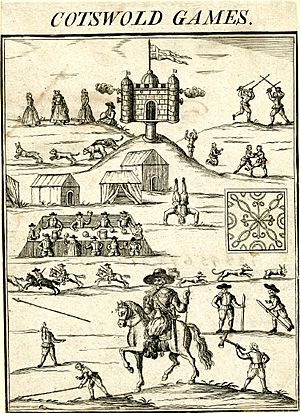Robert Dover (Cotswold Games) facts for kids
Robert Dover (born between 1575 and 1582, died 1652) was an English lawyer, writer, and a very clever person. He is most famous for starting and leading the Cotswold Olimpick Games for many years.
Contents
Who Was Robert Dover?
Robert Dover was likely born in Norfolk, England, sometime between 1575 and 1582. He was one of four children. It's hard to know the exact date because records from his hometown, Great Ellingham, only started much later.
In 1610, Robert Dover married Sibilla Sanford. She was the daughter of William Cole, who was an important church leader. Robert and Sibilla had two sons, Robert (who died as a baby) and John, and two daughters, Sibella and Abigail.
His Education and Work
Robert Dover went to the University of Cambridge in 1595. He might have been a "sizar" at Queens' College, which meant he got help with his fees. While he was at Cambridge, there were some "Gog Magog Games" held nearby. We don't know if these games were called "Olympik" back then, but they were by 1620.
Dover left university early. He wanted to avoid taking the Oath of Supremacy, which was an oath of loyalty to the King as head of the church. A "Robert Dover" was even questioned by officials looking for people who refused this oath.
On February 27, 1605, Dover joined Gray's Inn, which is a place where lawyers are trained. He probably became a lawyer in 1611.
Robert Dover was known for being very witty and clever. He also wrote a poem called The Wandering Jew, which is now lost. He moved to Saintbury in 1611.
Later, after he started the Games, he got help from a powerful friend named Endymion Porter. This friend helped Dover get a special set of royal clothes to wear when he led the Games. Later in his life, Robert Dover moved to Barton-on-the-Heath.
The Cotswold Olimpick Games
Robert Dover started his yearly Games around 1612. They were held in the Cotswold hills, near Chipping Campden. He was in charge of these Games for 40 years!
The Games were a mix of fancy court events and traditional country games. They were called the "Cotswold Olimpicks" in a famous book of poems called Annalia Dubrensia, which celebrated the events.
The Games included many fun activities:
- Cudgel-playing: A type of stick fighting.
- Shin-kicking: A sport where people try to kick each other's shins.
- Wrestling: A sport where two people try to pin each other down.
- Running at the quintain: A game where riders try to hit a target with a lance.
- Jumping: Simple jumping contests.
- Casting the bar and hammer: Throwing heavy objects.
- Hand-ball: A game similar to modern handball.
- Gymnastics: Exercises showing strength and flexibility.
- Rural dances and games: Traditional country dances and activities.
- Horse-racing: Races with horses.
The winners of these events received valuable prizes.
The Games stopped in 1642 because of the English Civil War. But they started again after the King returned to power in the Restoration. The Games continued until 1852. They were brought back to life again in 1951 and are still held today!
His Final Years
Robert Dover was buried in Barton on July 24, 1652.
How He Is Remembered
There is a special monument to Robert Dover at Dover's Hill, which is near Aston-sub-Edge. This monument helps people remember him and the amazing Games he created.
See also
- Cotswold Olimpick Games
- Shin-kicking
- Wenlock Olympian Games
 | Valerie Thomas |
 | Frederick McKinley Jones |
 | George Edward Alcorn Jr. |
 | Thomas Mensah |


